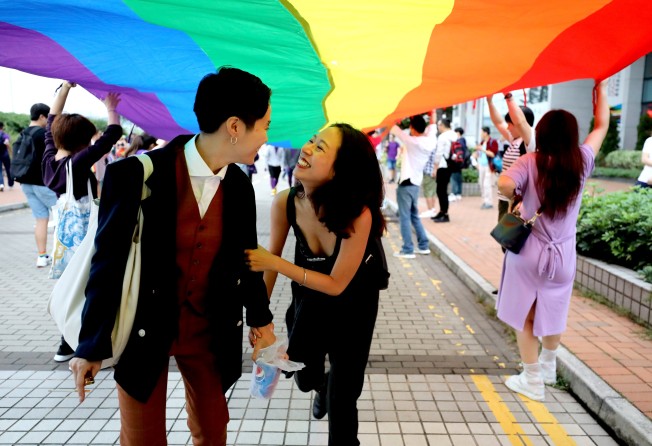Same-sex couple benefits ruling a step forward, but equality remains far off in Hong Kong
- Ruling is a giant step forward for LGBT activism, but it is by no means adequate as an answer to calls for progress and equality

The Court of Final Appeal ruled last Thursday that Angus Leung, a civil servant, and his husband were entitled to spousal benefits and a joint tax assessment – as with any other married couple in Hong Kong. This ruling is a giant step forward for LGBT activism in Hong Kong, in that it allows same-sex couples to de facto access many of the socioeconomic benefits afforded historically only to their heterosexual counterparts, but it is by no means adequate as an answer to calls for progress and equality.
There are several key insights that we can draw from this decision.
The first is the court’s explicit rejection of “ … the prevailing views of the community … since reliance on the absence of a majority consensus as a reason for rejecting a minority’s claim is inimical in principle to fundamental rights”. This is absolutely correct – consider a hypothetical society with two classes, with the dominant class seeking to expropriate their wealth, denigrate the other class as inferior, and to deny them social mobility opportunities. Just because the dominant class outnumbers the other offers them no particular moral authority, especially over issues that affect the very core well-being of that minority. From ancient Confucian philosophy to Madisonian democracy, we have learnt that the tyranny of majority must be resisted at all costs if it infringes upon any member of society’s ability to live, participate, and act politically as equals.
In many ways, the persistent denial of spousal benefits to same-sex couples is precisely as above – it reflects a stripping of couples’ ability to derive financial protections and legal recognition, and signals that they are second-class citizens. Since when have we allowed individuals to dictate others’ core welfare and well-being on the basis of tastes and preferences? As a city that prides itself on its freedom, Hong Kong has much to learn from the court’s verdict that highlights the independent value in associational, egalitarian freedom beyond the whimsical interpretations of opportunistic politicians.
The second insight is that, as with the LGBT movement in the US and abroad, Hong Kong activists may find more success in the courtroom than in attempting to shift public attitudes. Courts are comparatively less susceptible to lobbying and political capture by powerful, conservative blocs; they are also more open to hearing testimonies from both sides and considering them with reasonable (not necessarily equal) weightings. From the Court of First Instance’s striking-down and modifications to the seven criminal offences targeting homosexual men to the landmark ruling on Thursday, Hong Kong’s rule of law has proven to be a resilient bastion of moral integrity against pressures to keep Hong Kong in the 19th century.
Finally, the court’s rebuking of the clichéd objection to same-sex couples’ rights makes for sound ebullience among advocates: there is no reason why fewer heterosexual couples would emerge merely because same-sex couples are granted benefits. Individuals do not marry with the intention of enjoying spousal benefits. If a heterosexual marriage is founded on coercing economically desperate individuals away from their sexual orientations, there would be little value in such a forced relationship.
Perhaps the objection, then, is that marriage must be kept between a man and a woman, and any alteration or addition to this ideal type would tarnish the sanctity of marriage. Yet this argument also does not stand – we wouldn’t resist the introduction of Japanese restaurants into a mall with the fear that it would tarnish how their rivals next door prepare Chinese food. Marriage is the business of two consenting adults – and no one beyond that. Heterosexual couples are entitled to viewing their relationship as distinctly unique and irreplaceable – but such entitlement should never extend to denigrating or silencing others’ relationships.
Brian Y.S. Wong is a Master of Philosophy student of politics (political theory) at Wolfson College, Oxford University